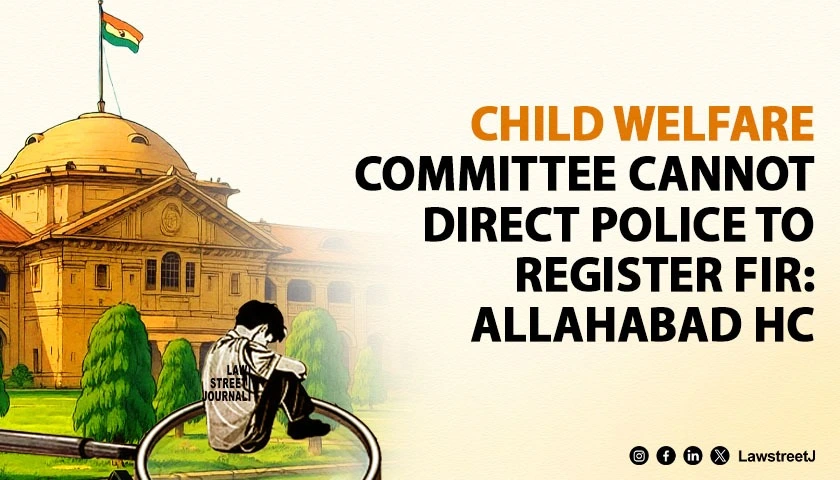Prayagraj: The Allahabad High Court recently held that Child Welfare Committees, despite having powers equivalent to a Judicial Magistrate, cannot direct police authorities to register First Information Reports (FIRs).
Justice Chawan Prakash ruled that the Committee exceeded its jurisdiction by ordering FIR registration under the Prohibition of Child Marriage Act, 2006, since its powers are limited to proceedings concerning children in need of care and protection.
The Court observed that while Section 27(9) of the Juvenile Justice Act, 2015 empowers the Child Welfare Committee to function as a Bench with powers of a Judicial Magistrate of the First Class, these powers are restricted to matters involving children requiring care and protection. The Court further elaborated that the Committee’s powers, though both administrative and judicial in nature, are “intended to be exercised solely for the purpose of ensuring the care, protection, rehabilitation, and best interest of the child,” noting that “the Committee, therefore, cannot exercise such powers to direct the police to register a First Information Report.”
The revisionists (father and husband of the victim) challenged an order passed by the Nyaypeeth Bal Kalyan Samiti, Badaun, which directed the police to register an FIR under the Prohibition of Child Marriage Act, 2006. The case originated when the father lodged a complaint alleging that his minor daughter had been enticed away by four accused persons. During investigation, the victim was found to be pregnant and married to the second revisionist.
Upon determining, through her school certificate showing her date of birth as 01.03.2007, that the victim was a minor, the Child Welfare Committee handed her custody to her father and simultaneously directed the police to register an FIR against the concerned persons for violation of the Prohibition of Child Marriage Act, 2006.
The revisionists contended that the marriage was solemnised as per Hindu rites and customs and that the Child Welfare Committee had no jurisdiction to direct the police to register an FIR, making the order liable to be set aside.
In response, the State argued that the Committee acted correctly based on the victim’s educational certificate and medical examination, which confirmed she was a minor and pregnant.
The Court noted that Section 30 of the Juvenile Justice Act, 2015 prescribes the functions and responsibilities of the Committee, but nowhere does it empower the Committee to direct the police to register an FIR in any cognizable offence. The Court further observed that under Section 156(3) of the Code of Criminal Procedure, only a Magistrate empowered under Section 190 may direct the police to register an FIR.
The Court distinguished between the Committee’s reporting function and directive authority, holding that the Child Welfare Committee may forward a report to the Juvenile Justice Board or concerned police authority regarding violations, but cannot issue directions for FIR registration, as such power exceeds its jurisdiction.
Case Details:
Case Name: Rishi Pal and Another v. State of U.P. and Another
Case No.: Criminal Revision No. 3622 of 2021
Date of Decision: 09.10.2025
For the Revisionists: Adv. Sarvajeet Singh



!["No Loudspeakers For Azan, No Fundamental Right To Create Noise," Says Allahabad HC To Two Mosques [Read Judgment]](/secure/uploads/2020/01/lj_4995_Allahabad_HC_AZAN.jpg)






